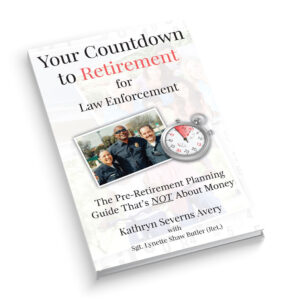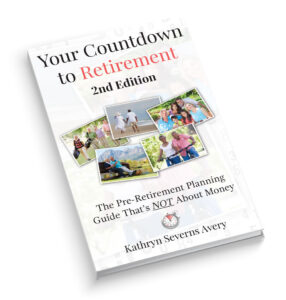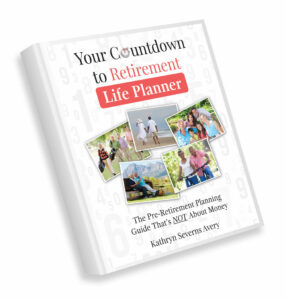It's Not Just About the Money!
Retirement Revisited
-
Author : Your Countdown to Retirement
Date : February 19, 2019
Category : Lifestyle, Redefining Retirement, Retirement Planning
Comments : 0
Like : 0

by Kathryn Severns Avery
The current concept of retirement in the United States, decades of time spent in idyllic leisure activities and pleasurable pursuits, is unprecedented. The truth is until the mid-1940s most Americans either worked until the day they died or retired from working and died shortly thereafter.
Baby boomers are the first generation to expect to have 10, 20, or even 30 years of time where they are no longer working. Many are excited by the prospect of not working and doing what they want to do when then want to do it. But most baby boomers don’t realize the significant changes no longer working will bring to their lives.
The first phase of retirement, “Unlimited Vacation,” is the time when many retirees travel, check items off their “bucket list”, and have an almost euphoric sense of well-being and happiness. But according to a 2012 study by Elizabeth M. Horner, PhD this honeymoon phase is followed by a significant decline in subjective well-being.
While researching my book, Your Countdown to Retirement, I found the same to be true of the many retirees I interviewed. “At first it was fun, “a retired teacher told me. “Then it became a real grind to find things to do that were both interesting and fulfilling.”
A 2013 survey of retirees by the Skipton Building Society in the United Kingdom found that the joy of retirement wore off after just 10 months. Many retirees surveyed said they missed the camaraderie of working. Others found themselves bickering with their spouses because of the increased time spent together.
The common denominator for many retirees is their unawareness of and unpreparedness for the emotional changes that occur when one stops working. Few baby boomers have a financial plan for their retirement. Fewer still have a plan for identifying and coping with the myriad of non-financial changes that occur in retirement.
The first year is filled with changes in daily structure and for some, a profound sense of loss. During his first year of not working my husband, normally an upbeat and positive person, found himself fighting off depression. “No one prepares you for the loss of identity and lack of daily structure that happen in the first few years,” he said. “It takes a while to sort things out and find your way.”
The lack of daily structure once provided by getting to work, working, and returning home at the end of the day can be disorienting. Retirees may feel like Bill Murray’s character, Phil Connors, in the movie Groundhog Day where every day is almost identical. “What day is this?” is an often asked question in the first year because a retiree’s schedule no longer revolves around the traditional work week.
What can one do to lessen these difficult first year experiences? Start by creating a plan well in advance of your last day of work for what you will do during the first six months. This is not always as easy as it seems. Couples often disagree about where they will spend their retirement, how they will spend their time, and how much time they will spend together.
That is why it is vital to sample experiences, activities, and locales. It’s a great way to learn what you do like and what you don’t like before you retire. I learned about the value of sampling experiences early in life. After graduating from college I thought I wanted to be a helicopter pilot. Whenever I talked with people, I told them I wanted to be a helicopter pilot. I even talked to a Coast Guard recruiter about pursuing my “dream job.” At that time I worked for a radio station that owned a traffic helicopter, and on my birthday I was invited to go up with the traffic reporter. During that experience I discovered something extraordinary. I didn’t want to be a helicopter pilot; I wanted the experience of flying in a helicopter.
That flight changed the course of my life and taught me the difference between a desired experience and a passion to which I wanted to dedicate time, attention, and resources. Sampling various experiences helps you determine whether or not the desire is a passing fancy or a passion that may provide great long-term satisfaction in retirement.
My uncle told me of a friend who wanted to build bird houses once he retired. He converted his garage into a sophisticated woodworking shop and began designing, building, and selling his beautiful birdhouses. Unfortunately, there wasn’t a strong market for his product. He began giving away his beloved creations. Soon all of his friends and family had more birdhouses than they knew what to do with. He then started mounting them on the walls of his garage. He eventually ran out of space and became quite depressed. What he thought he wanted to do didn’t pan out and he had no Plan B.
The idea of playing golf all day everyday may sound idyllic to you, but how does your wife or significant other feel about that choice? As tempting as it might be to think otherwise, creating a plan for what you want to do in retirement has a ripple effect. Your spouse, your family, and your friends are all affected by your choices. Their choices also affect you. I have heard countless stories of retirees moving to be close to their children and grandchildren only to have a job transfer destroy their plans for family togetherness.
The sooner you start researching retirement options and sampling experiences, activities, locales and interactions the better. The more information you gather and evaluate, the better your retirement plan will be. If you are ready to start putting together a plan for your retirement, or the retirement of someone you love, contact us! Or, visit us at our What’s Next for Boomers Life Planning Center.
Subscribe to YCTR!
Latest Blog Posts





